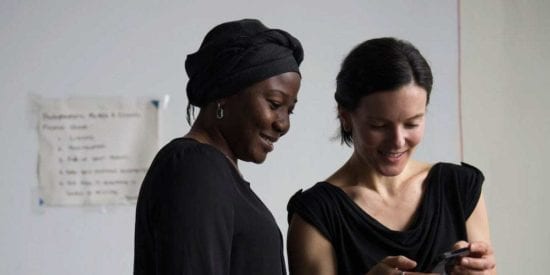A town united through soccer

Lewiston, Maine – author Amy Bass honors a student soccer player who was a refugee from Somalia and later became part of a town united through soccer.
I first met Maulid in a hallway outside the cafeteria at Lewiston High School, halfway through a day of shadowing Coach Mike McGraw, head coach of the soccer team for thirty-plus years.
I was spending time at the high school as part of my research for One Goal: A Coach, A Team, and the Game That Brought A Divided Town Together. McGraw introduced us, and I told Maulid I wanted to talk to him, that I was writing a book about the team, and that I knew he was going to be an important character. He said “sure” as he walked off, his bright yellow dashiki making a stark contrast with the pale gray walls of the hallway. I wondered when – if – it would happen.
I didn’t have long to wait. At the end of the school day, as McGraw cleaned up materials in his biology classroom, sorting the various glass containers that had been part of a lesson about glucose, Maulid appeared.
“You ready?” he asked me.
I stared at him blankly, wondering what he meant.
“You said you wanted to talk to me,” he continued, flashing a grin that I would come to know very well.
I wasn’t prepared. I didn’t have my lists of questions with me, or my notes, or really much of anything. But I knew I couldn’t let this chance go. I took some quick snapshots of him, and then took out my voice recorder, which I’d learned to never be without. We sat down across from one another at a lab table and started chatting, McGraw bidding us good-bye as he walked out the door, done for the day.
We talked about Dadaab, Kenya, the refugee camp where he was born.
How his parents, Shafea Omar and Hassan Matan, got to Dadaab from Jilib, a city located in the Middle Juba region of Somalia and a key battleground after the fall of Mogadishu in 2006. He told me how they moved from the camp in Dadaab to one Kakuma as part of the process to get to the United States, and then to Georgia, and then, finally, to Maine.
Despite never having been there, when anyone asks Maulid where he’s from, he still says Somalia.
While memories of Africa continue to fade, his early days at Montello Elementary School, when he didn’t understand anything that was going on around him, remain vivid.
“It was mad scary,” he told me about his first days in school.
We talked about the first Fourth of July the family spent in the United States, when the sounds of fireworks terrified his mother, who brought her children inside because she was convinced war was coming.
“They thought the noise was gunfire, that people were dying in the streets, something that was all too familiar. They’d been enjoying summer; the weather reminded them of Africa. But the second his mother saw a firework – ‘fire in the sky’ – she told her children to get inside. Eventually, Maulid learned about the holiday at school and from some of his Lewiston-born neighbors in the apartment upstairs. He remembers eventually going to the park with them to watch; they’d assured him it would be safe. He went home to tell his mother it was okay. ‘No,’ she told him. ‘It’s guns, it’s fighting.’ Maulid finally got her to understand that no one was fighting, but his parents still don’t like the Fourth of July.” – From Chapter 5, One Goal
And we talked about soccer, how it made him feel, and how he doesn’t have any memories before it. We talked so long that the lights went out in the classroom, the last ones in the building.
The next time I saw Maulid, it was in the parking lot behind the high school where the team was gathering before a summer league game. It had been a few weeks since our conversation, so I wasn’t sure he remembered me, and I didn’t want to embarrass him in front of his teammates. The game was against Mt. Ararat High School in Topsham, about half an hour away. There’s no school bus for summer games – the team is pretty much on its own. I told McGraw I could take some with me, having no idea if that was allowed. He bellowed to the team that some could go with me. Maulid walked over.
“Shotgun,” he said, that grin returning to his face. Suddenly, three others stood behind him, willing to take a chance on me. Maulid had opened the door.
Dr. Amy Bass is a professor of history at the College of New Rochelle and the author of ONE GOAL: A Coach, A Team, and the Game That Brought A Divided Town Together.

Get informed, volunteer, and find other ways to welcome our newest neighbors in the USA.